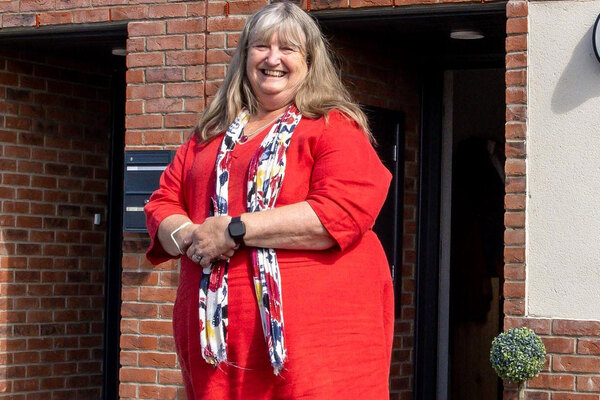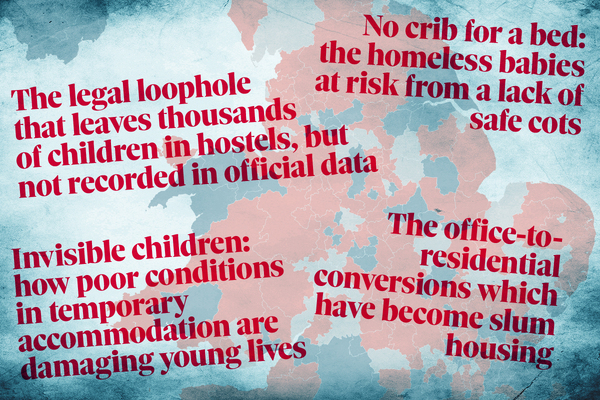You are viewing 1 of your 1 free articles
We must not shy away from showing policymakers the truth of the homelessness crisis
More investment is crucial if this is to be the peak of the homelessness crisis, writes John Glenton, executive director for care and support at Riverside
Last month, we co-hosted a lobby day in Westminster which brought together more than 100 organisations and engaged with more than 70 MPs. It was heartening that in this election year, we had Felicity Buchan, the homelessness minister, and Mike Amesbury, the shadow homelessness minister, speaking at the event.
What impressed me is that I got the feeling all MPs who attended on the day listened to what the homelessness sector had to say and that some of them have been listening to us more closely over the past year.
In terms of where the homelessness sector is right now, I think it is our responsibility to be open and honest with policymakers so they can implement policy which has a better chance of working. As such, it is important for me to tell policymakers that after 35 years of working in the sector I’ve never known things to be so bad. Never.
The latest data from July to September 2023 showed we have record high numbers of households (109,000) and children living in temporary accommodation (142,900, including more than 87,000 children aged under 10). This is a genuine humanitarian crisis unfolding in towns and cities across England.
However, while none of us have ever seen so many people living in temporary housing in England, it is also true to say that none of us have known such a severe financial crisis affecting the local authorities who pay for temporary accommodation.
As such, I understand why individual councils feel a genuine need to cut homelessness services. However, in the long run, this approach will be more expensive not only due to the cost of temporary accommodation, but also because the longer a person is homeless, the more complex their support needs become.
Councils are facing a situation where they have to weigh up the closure of one service against the closure of another.
“I understand why individual councils feel a genuine need to cut homelessness services. However, in the long run, this approach will be more expensive”
However, it is important for central government to understand that closing homelessness services is a false economy.
Closing homelessness services means taxpayers are forced to spend even greater sums of money on temporary accommodation and people affected by homelessness have worse outcomes.
Research and data show that supported housing prevents homelessness and helps end the cycle of long-term homelessness.
Their research, supported by Riverside, tells us that were it not for supported housing, there would be an increase in core homelessness of around 41,000 people, with a further 30,000 people at significant risk of future homelessness.
Researchers at the Centre for Housing Policy at the University of York estimated that the cost to the public purse of long-term homelessness is more than £40,000 per person per year. Decommissioning homelessness services means more people becoming homeless and a higher bill for local authorities in the long term.
As a sector, we keep hearing more and more calls for Housing First pilots to be rolled out across more local authorities.
“In the short-term, central government could act to protect funding for supported services in local authorities”
However, at a time when cheaper supported housing services and even floating support are being cut, councils should be careful about spending limited funds on homelessness on commissioning Housing First.
A very high percentage of people already achieve a successful outcome in more traditional forms of short-term supported housing. In Riverside’s case, more than four-fifths of people (83%) moved on from homelessness in 2021-22 after staying in hostels and shelters for a maximum of 24 months. There are a few measures the government can introduce to reduce homelessness.
In the short-term, central government could act to protect funding for supported services in local authorities. It can also turn the tap off on increasing homelessness by uplifting Local Housing Allowance (LHA) rates further to enable more people to afford housing in the private rented sector.
This will also save taxpayers money as the private rented sector is cheaper than temporary accommodation. It is not possible to solve the homelessness crisis in the long-term without increasing the supply of homes.
With housing associations now warning that it is becoming unaffordable to build social and affordable housing, we need to ensure that the next government can provide sufficient long-term grant funding to help build more social and affordable homes.
John Glenton, executive director for care and support, Riverside
Sign up for our homelessness bulletin
Already have an account? Click here to manage your newsletters













